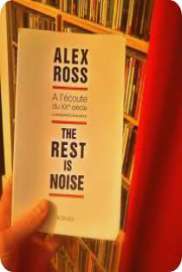

How well has Ross carried out this program? One doesn't find much precedent, certainly not much successful precedent, although Ross has read what's available and the bibliography lists several such studies. Ross tackles big questions: How did non-musical events influence music? How did music influence history, if at all? How did musical developments in one area influence those in others? Any one of these would merit a book all to itself. Classical composers, it turns out, tend not to stand in isolation, either from society at large or from each other. The stuff on Strauss's Salome caught me, especially since Ross traces the influence of particular details in the score to other, not necessarily similar works. The stories Ross tells are good (for example, how Schoenberg went Hollywood), and his descriptions of specific pieces of music insightful. Even a retreat from the times comments on the times, after all. I also greatly appreciate that, unlike many who have tackled Modern music, Ross doesn't consider classical music in isolation, either from pop and jazz or from political history. As many reviewers have remarked, this book's a page-turner, a feat not easily accomplished in essentially a survey. Ross provides a pleasant surprise in that, unlike most of his New Yorker pieces, here he writes really good prose – elegant, humorous, and at times really eloquent. I think the author has the right to choose those examples who make his case, even if that means passing over favorites. As much as I love Vaughan Williams, Gustav Holst, and Ernest Bloch, they really do represent the end of something. So most English composers get ignored, although Sibelius, who influenced many of them, receives extended treatment. Most writers of books like this look for composers who have many connections to others leading from them – in other words, they seek out artists who will stand for movements rather than for just themselves. You can at best discuss only a few of the many fine composers who belong to essentially the Modern and the Contemporary, and thus you need criteria. However, despite its flaws (and it does have them), Ross's book heroically tries to make the most artistically polyglot of centuries cohere and will probably become a classic work.Įven with what seems like the palatial room of 600 pages, you can't talk about everybody. Right off the bat I should tell you that I consider Alex Ross the dullest music critic the New Yorker ever gave a byline to. Summary for the Busy Executive: Missed it by that much.


 0 kommentar(er)
0 kommentar(er)
